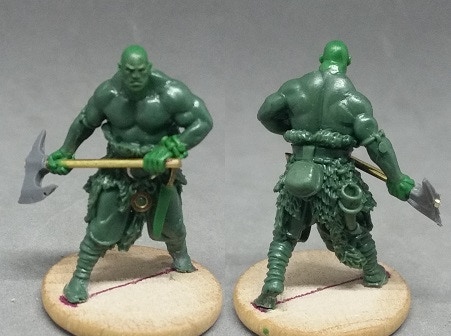Continuing our voyage of discovery down the great river, we get to the second part of Philip José Farmers Riverworld saga -
The Fabulous Riverboat (1971). I don't know about you but the title makes me think the novel is going to be a cross between
It Aint Half Hot Mum,
Pricilla Queen of the Desert and
Love Boat, maybe a gay romance novel set in the deep south with show-tunes. It isn't much like that at all. Although there is a boat.
 |
| First Edition cover by Richard Powers |
 |
| Richard Powers cover for TYSBG |
I like these covers a lot, much better than the cruddy 1990s cover I own. Powers covers hang between an early Ian Miller and Dave McKean assemblage, echoes of constructivism. Nice stuff, and a slight departure from the usual sci-fi psychedelica
Powers is known for. If I were to hunt down editions, rather than just pick them up randomly, these would be they.
What we do have is the continuation of the progress of humanity as set up in
To Your Scattered Bodies Go (see here). Having started to settle in a little, humanity starts to organise itself into geographically tied social groups, and following old habits, something like nations begin to form. In this Farmer is probably (and quite depressingly) accurate in his depiction of human nature. Even when freed from history, consequence and responsibility, people still seem to refuse rugged individualism.
This time around, Farmer rolls 1D6 times on the D100
Random Character From History Table, and writes us a novel featuring Sam Clemens (aka Mark Twain), Eric Bloodaxe, Joe Miller (an enormous caveman), King John, Cyrano de Bergerac and a nation of Black Separatists.
The racial tension theme runs quite strongly through the second half of the novel, with key characters having living through or just after the American Apartheid and segregation, and still thinking in Earth-terms about white oppression and race relations. Sam Clemens is forced to
confront his use of the word Nigger, whilst simultaneously explaining that
Huckleberry Finn is pretty much anti-racist, and the book can't be read any more so can't actually matter. All good stuff.
The first half is much more about the comedy Vikings and establishing Sam as a rabid technologist who just wants to build a damn boat to get to the source of The River, but having to deal with treacherous heavies like King John to get the job done. Having influence with the Ethicals (as the entities running the Riverworld Experiment are known), an iron-bearing meteorite is brought down to help in his quest, iron being used to build the steam-ship. Indeed most of the novel is about the problems of getting the ship built, alongside developing black-powder weapons.
More thoughts on Gaming Riverworld
A hex based wargaming campaign. The technological development of the
Riverboat is very much like building dev / arms race in a RTS. There's a kind of ur-Cold War, ideological driven
thing waiting to be shaped. Perhaps something like
Imperialism in Space meets
Cosmic Encounter. Resources, exploration, empire building, diplomacy...
 |
Never miss an opportunity to shoehorn in some great
1980's John Blanche artwork |
The reincarnation effect could be a different take on multiple lives inherent in videogames. A Riverworldian MMORPG would have interesting repercussions for guilds and the suchlike, but perhaps more suited to Roguelike or solo dungeoncrawl / exploration game where death simply removes the players avatar to another part of the labyrinth or landscape, robbing him of all equipment, followers and henchmen, as well as confusing the players sense of place. I don't know of any game that uses a random-character-respawn-location mechanic as a reward for character death, but perhaps there is one.
The Oldhammer Consequences
So what of the
Fabulous Riverboats impact on early
Warhammer?
The Magnificent Sven
Whilst we don't actually get to see much river-action in the
Fabulous Riverboat by now I'm pretty much convinced that the motley crew of mismatched characters taken from wildly disparate fantasy cultures in
Sven, is inspired by, if not straight-forwardly based on the groups of wildly disparate historical cultures in The Riverworld sequence. It's tempting to think of Warhammers Lustria, or indeed the whole of the Known World as an example of the ideologically and racially discreet nations that some of the Riverworldians seem keen on founding. A kind of identity politics writ large.
Then there's the boat "The Not For Hire" and the boat "The Voltsvagen" - there's no need for a steam-powered paddle-boat to turn up along the rivers of Lustria, why not a simple medieval-level boat or a pre-colonial floatila? The specific appearance of an anachronistic steam paddler is far too much of a coincidence to not be a direct lift.
 |
| Punhammer shock |
Meteor Technology
I'm sure there are other fictional examples of meteors landing and giving a technological boost to its finders. If it's not a well worn trope, it should be. Riverworld gets its iron, and the Warhammer World gets its Warpstone from large meteoric deposits. In fact there definitely are precursors in the magico-religious meteor in Abrahamic religions but that's a path to take another time.
Anarchonistic Technology
From the First Citadel Journal's "Warhammer and Sci-Fi", throwing guns into the Warhammer mix right there in first edition. I don't think it's really a coincidence that
Riverworlds motifs of a stranded alien (who turns up on the banks of a river no less) and impact of blackpowder technologies within an otherwise 'primitive' technological framework and
The Legend of Kremlo. In parallel with the Steamboat, there are also the development of small aircraft in the guise of gliders. Indeed if one thinks about it really hard, preferably while staring into the bottom of a pint of Guinness, Warhammer 40k's gothic-sci-fi is a reasonably neat depiction of the end-game of Riverworldian human cultural-technological advancement, but then I said that
last time too.
Of course, our Oldhammerish voyage to the Riverworld does not end here, but continues with
The Dark Design. Which almost predictably contains a character which
one review calls "a stereotype of the militant lesbian feminist of the 1970s".
Yeah... get in!
 |
| amazons: lesbian feminist separatists |


















